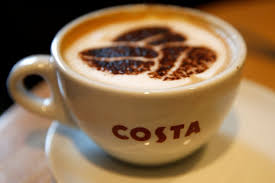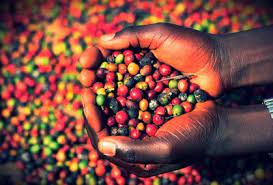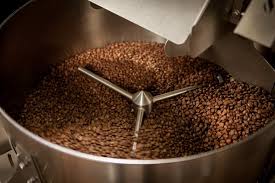The Different Coffees Used by Chain Companies in the UK

What are the Different Coffees Used by Chain Companies in the UK?
In this article we will be exploring the origins of the coffees used in the largest coffee serving chains in the UK. We will be assessing the quality, sustainability, and value of these companies' coffee drinks. While we all know that the quality of coffee you get from a chain company will never be of the same standard than if you went to a Coffee Roastery or purchased speciality coffee beans, sometimes you just need to grab something quickly.
Even those of us who are coffee enthusiasts can get caught short and have to pick up a convenient cup that we wouldn’t otherwise drink. But which chains offer both ethical and quality coffee?
McDonalds Coffee
McDonalds is on the way to using 100% Fairtrade coffee and currently mainly sources their beans from Colombia. The company has been a long-time supporter of Fair Trade as, like Bloss, they believe that it is important for farmers to have access to better prices for their crops. They also support sustainable farming practices such as organic growing methods and their ultimate goal is to have fully sustainable coffee in the next 5 years.
This means sourcing all their coffee directly from farms where there are no child labour or forced labour issues or even poor working conditions. McDonald’s supports fair trade organisations like "Cafe-for-all" who work with small scale producers around the world.
They use only 100% Arabica coffee grown without pesticides or chemical fertilisers. This ensures that the farmer gets paid fairly for his crop and can continue producing food for himself and his family. It also helps protect the environment because less chemicals being sprayed onto the land reduces pollution.
Fairtrade certification guarantees that workers get at least $2 per day above what would normally be expected. In addition, the organisation works closely with local communities so that everyone benefits from the increased income generated through trading.
Advantages - Great value for money. Coffee is grown without pesticides. Highest caffeine content. Works with the Rainforest Alliance.
Disadvantages - Not 100% Fairtrade. Doesn’t taste great as McDonalds focus on their food.

Costa Coffee
Costa has been on a mission to be sustainable for a long time. Their aim was to source 100% certified organically grown coffee within 3 years. This meant finding suppliers who were not only ethical but had good business practice too. Costa now uses mostly Colombian coffee due to its high quality and low cost. However, they do still buy some Kenyan coffee because it's cheaper than Colombian.
Costa founded their very own charity in 2006 called the Costa foundation. The goal of this charity was to eradicate poverty in areas of the world where struggling coffee growing communities reside. They mainly do this by providing quality education to the young people of these areas.
They have recently started buying more Brazilian coffee so that they can help to improve the lives of those living in Brazil. In addition to being an ethical organisation Costa also works closely with local communities through projects such as building schools and hospitals.
Costa sources 100% of its hot chocolate and coffee from fully Rainforest Alliance certified farms and in 2020 Costa was one of the first in its sector to win the RSPO Certification for being highly efficient in not using unsustainable palm oil.
Advantages - A percentage of profits goes to charity. 100% sustainably grown. As a dedicated coffee shop, the quality if higher than other chains that serve coffee.
Disadvantages - 2nd most expensive option.
Starbucks Coffee
Starbucks first began selling Fairtrade coffee back in 1997 when they bought 50 tonnes of coffee from Guatemala. Since then they've gone on to become one of the biggest buyers of Fairtrade coffee in the world. Today they sell about 1 million pounds of coffee every week.
In order to ensure that Starbucks coffee is ethically sourced they go out of their way to find suppliers who meet certain criteria. These include:
No child labour.
No forced labour.
Minimum wage set at $1.25 USD/day.
Workers receive minimum health care.
Workers must have free choice over how much money they want to earn.
Farmers must be able to grow their crops sustainably.
Farmer families should benefit financially from higher incomes.
Starbucks started out selling only Fairtrade coffee but now uses mostly Arabica coffee sourced from Brazil, Columbia, Costa Rica, Indonesia, Kenya, Mexico, Peru, Rwanda, Tanzania, Vietnam and Yemen. Their main focus is to source ethical and high-quality arabica coffee beans rather than to be sustainable.
Starbucks uses beans grown on small farms around the world including Colombia, Brazil, Costa Rica, Guatemala, Honduras, Mexico, Nicaragua, Panama, Peru, El Salvador, Sri Lanka, Vietnam and Indonesia.
Starbucks is committed to sourcing only ethically produced coffee. In addition to ethical production standards, Starbucks source their coffee from cooperatives where all members receive an equal share of profits. This ensures that there is no exploitation or unfair labour practice within the cooperative.
Advantages - Lots of drink options. Ethical practices. Good reputation. Rewards system.
Disadvantages - Uses mainly non-sustainable coffee beans. Trades quality for convenience. Most expensive option.

Caffe Nero's Coffee
Coffee Nero, quite like McDonalds, is in the process of changing to 100% Fairtrade and sustainable beans but doesn't yet obtain all its beans this way.
It does however work alongside other organisations to try and change the industry towards sustainability. For example, Caffe Nero's worked with the Rainforest Alliance to create the Sustainable Agriculture Standards which aims to make sure that farmers get paid fairly and that workers rights are respected.
Caffe Nero's buys fair trade coffee from farmers in Latin America and Africa. They buy a lot of coffee from Ethiopia because it has been shown to produce better quality coffee than any other country. The majority of their coffee comes from countries such as Bolivia, Ghana, India, Madagascar, Malawi, Mozambique, Nigeria, Uganda, Zambia and Zimbabwe.
In an attempt to reduce the waste caused by its stores, Caffe Nero has been collecting its used coffee grounds since 2016 from around 122 stores in London. They process these coffee grounds into fuels by using biomass boilers.
Advantages - Pays premium prices for premium coffee. Works with the Rainforest Alliance.
Disadvantages - Not 100% Fairtrade.
Looking for a coffee that is both ethically farmed and high quality? You can visit us in Kent or buy coffee beans online.






